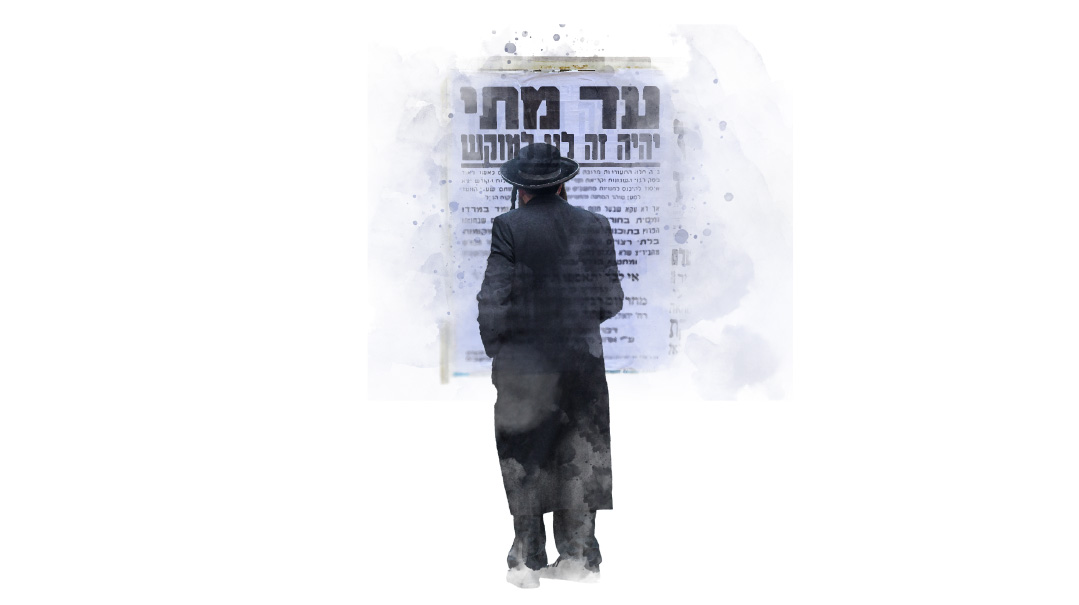Two Slips of Paper, Six Little Words

There is, however, one casualty of this war that is very welcome, and that is the aura of invincibility and power that enveloped Israel and its armed forces for decades
“One should always remember that bishvili nivra ha’olam — because of me was the world created…”
(Sanhedrin 37a)
Said Avraham Avinu: “Anochi afar va’efer — I am but dust and ashes…”
(Bereishis 18:27 )
Question: are these not contradictory? How do we reconcile these two passages that seem to offer opposing messages? For a suggested answer, see below.
The anguish and suffering of the war’s daily casualty lists are shared by all of us. May the Merciful One comfort the bereaved, bind all wounds, speedily return our captives, and grant us a lasting triumph over those who would destroy Am Yisrael.
There is, however, one casualty of this war that is very welcome, and that is the aura of invincibility and power that enveloped Israel and its armed forces for decades. On October 7, this myth of “kochi v’otzem yadi — my power and my strength”(Devarim 8:17 ) was shattered. We grieve for the victims of that terrible day and the war that followed, but the lessons learned on that day — not only military lessons but especially conceptual and religious ones — can only benefit us in the long term.
That a military force should believe in its own power is both good and bad. It is good, because a) self-confidence is crucial; and b) such myths cause enemies to think twice before meddling with us. But it is also bad, because overconfidence and excessive pride can lead to apathy, slipshod thinking, and, most dangerously, to underestimating the enemy, for all of which Israel is now paying a heavy price — although the IDF still remains one of the top fighting forces in the world.
It is ironic that an army’s sense of vulnerability and an awareness of one’s weaknesses can be a crucial wake-up call, and can result in a stronger military.
Thus the paradox: Belief in one’s invincibility ultimately weakens an army, while knowledge of one’s vulnerability ultimately strengthens an army. The warning in Mishlei 16:18, “lifnei shever, gaon — pride goeth before the destruction,” is not limited to individuals.
The key is to strike a proper balance between confidence in our strengths and skills (and, in our case, faith in G-d) versus constant recognition of the need to improve and sharpen our capabilities.
This search for a delicate balance is also true of individuals. There is a fine line between arrogance and self- confidence; there is a similar fine line between self-deprecation and humility. Self-confidence (I know my strengths) and humility (I need to improve) are twins; together they are engines for success and spiritual growth. Similarly, arrogance (I am better than anyone) and self-deprecation (I am totally worthless) are engines for failure and spiritual emptiness.
Moshe Rabbeinu is the great exemplar for this. The Torah says of him, “and the man Moshe was the most humble of all men” (Bamidbar 12:3). Humble? But surely, he was aware that he fought for the Jews in Egypt, led them out of slavery, guided them through the wilderness, and brought them to the edge of the Promised Land. Surely, he recognized his abilities. But he was not arrogant, for he knew that his superhuman gifts were not of his own making, but came from Above. He was both self-confident and humble at the same time.
This is the meaning of those two contradictory pericopes. In his famous aphorism, the 18th-century chassidic sage, Rav Simcha Bunim, speaks of two pockets in our clothing. In one pocket, he says, keep a slip of paper on which is inscribed Avraham’s statement about dust and ashes. In the other pocket, keep a slip of paper on which is inscribed the Gemara’s comment about G-d creating the world for me.
Two little slips of paper, each with three little words: Study them both every day, maintain a balance between them, use only as directed, and take good care of them, because victory and defeat on the battlefields of life are concealed deep within those six mysterious words.
(Originally featured in Mishpacha, Issue 998)
Oops! We could not locate your form.







